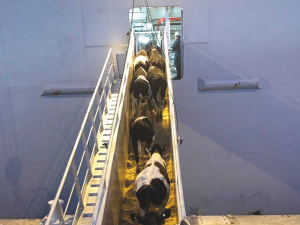Farmer lobby Federated Farmers is hopeful that live animal exports look set to return with the election of the new coalition government.
However, both Feds and the group that represents live exporters, Live Export NZ (LENZ), say this will only happen with new 'gold standard' requirements to protect animal welfare and safety.
Governing coalition partners - National, ACT and NZ First - all committed during election campaigning to reversing the ban on live exports and putting enhanced animal welfare standards in place.
Feds dairy chair Richard McIntyre says the organisation had pushed for this move and is pleased the new Government will follow up on the campaign commitment.
McIntyre says live exports are a significant earner for farmers when domestic market and environmental conditions, such as droughts, are unfavourable. Live exports have earned New Zealand around $300-$400 a year (that jumped to $524m last year, with the ban on the horizon).
The Regulatory Impact Statement (RIS) presented to the previous government, before it introduced the ban, said livestock exports make a small but important financial contribution to individual farmers by helping diversify their income streams.
"In addition to fetching premium prices, if export cattle are sold as yearlings, farmers can receive an earlier than normal return on investment," it added.
The RIS also outline how in the 10 years to 2021, around 5000 farmers across New Zealand had supplied breeding cattle for export.
McIntyre says Federated Farmers also welcomes stronger welfare standards.
"New Zealand farmers already have high standards for animal welfare on-farm, and we expect the same with exported animals. This is about protecting our international reputation, but it's also about maintaining our reputation here in our communities."
He added that it is important to understand New Zealand live cattle exports are entirely for breeding purposes.
"People sometimes confuse live cattle exports with the live export for religious slaughter trade, which New Zealand won't be doing."
LENZ chair Mark Willis describes the Gold Standard animal welfare criteria, including post-arrival care and sustained monitoring in the animals' country of destination, as unmatched internationally.
McIntyre add that while New Zealand put a ban in place, other live animal exporting countries have carried on, likely filling any customer demand we abandoned.
Both Willis and McIntyre agree, if New Zealand was still involved, our high animal welfare standards would push others to lift their game.
"The global live cattle trade will continue but from countries and by exporters with lower animal standards filling the gap enforced on us."
Figures for 2019 show 39,700 live cattle were shipped from New Zealand. In comparison, Australia exported 44 times that number at 1.77m, the EU exported more than a million cattle, Brazil 535,289, Canada 746,300, and Mexico 205,230.
Willis believes an export licensing system needs to be in place when live exports begin again.
"Previously there was no ability for MPI to be able to place conditions on an exporter, to suspend or revoke the licence or whatever."
He estimates that legislation could be ready to be put in front of the Parliament by April, and the export trade re-started by around August.
Genetic Myth Busted
One of the "myths" Willis is keen to knock on the head is that live export sees our best genetics shipped offshore to countries we seek to sell our red meat and milk to.
"It's just not true. Farmers keep the best genetics for themselves; they're selling their surplus stock," he explains.
"Trade in best genetics [happens in] semen. New Zealand imports semen from all over the world in order to be able to get to better genetics. So, the idea that we're not going to be able to sell our own products because we export cattle is somewhat fanciful."



















